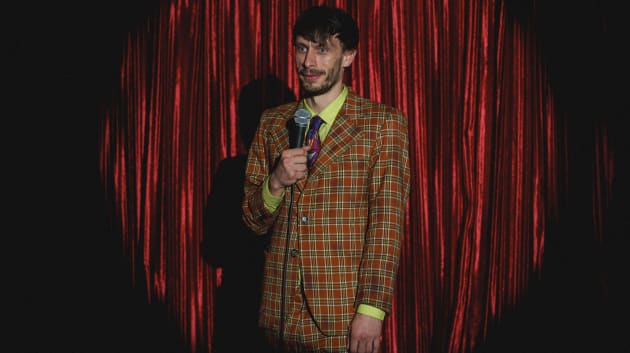How Baby Reindeer Flipped the Script, Making Even Vile Characters Incredibly Human

It’s a rare movie or TV series that comes along and captivates the audience with little more than dialogue.
Seven episodes of dialogue, in fact. Donny Dunn, the narrator and protagonist of Baby Reindeer, walks us through a brief period in his life, allegedly based on the real life of Richard Gadd, the architect of the series.
It’s not an uplifting story. Then again, tales of sexual abuse, violent stalking, drugs, psychological self-harm, and random bouts of hypersexuality rarely are.
After spending nearly seven hours walking the dank, twisting corridors of Richard Gadd’s hippocampus, some sparkling nuggets of humanity begin to show through the murky darkness.
The human side of the villain is so rare these days. It’s what made Marvel’s Thanos a surprisingly understandable character. He was evil beyond belief but understandable.
George R.R. Martin is famous (or perhaps infamous) for finding the grey areas in human thought and motivation. His characters are often loved despite their sinister and often violent doings.
Donny Dunn is as much the villain as he is the protagonist, as is his stalker, Martha, played with malignant glee by Jessica Gunning. But Donny isn’t the villain you or anyone else is used to seeing on screen.
The Magic of Bluey: Why this Popular Children’s Show Has the Whole World Watching
He alienates his friends, places them in threatening situations, bumbles from one failure to the next, insults his lovers, lies, and obfuscates at every opportunity.
Nevertheless, Richard Gadd’s portrayal of Donny is so effective that you can’t help rooting for him as the protagonist and, thus, the hero of the overarching storyline.
Soon after Martha walks into the pub where Donny works as a bartender, you know she’s probably trouble. If Donny doesn’t necessarily recognize the sense of wrongness behind her eyes and her raucous laughter, he at least understands that something isn’t right.
Despite this, Donny chooses to lead her on. Early in the series, he discovers that most of the life story she lays out for him over several hours in the pub each day is an outright lie. He also discovers her sordid history of stalking, along with previous arrests.
Knowing these things, he continues to string her along out of empathy for her or himself. Halfway through the series, it’s easy to dislike him, falling victim to his uncontrollable ability to make every situation worse.
It’s difficult to comprehend how he made it through this brief microcosm of his life without alienating and turning all of his friends, acquaintances, and love interests against him. Through some innate recognition of Donn’y vulnerabilities, Martha is drawn to him like a magnet.
While Donny is struggling socially, his pursuit of a career as a comedian suffers as well. His every attempt at comedic presentation is a lesson in discomfort. In fact, much of the series maintains a level of discomfort that is both distracting and absorbing.
To make matters worse, Donny sets up a dating app, where he soon meets Teri (Nava Mau), a trans woman with the potential to set Donny on a better path. Unfortunately, he also flubs this relationship despite Teri giving him every opportunity.
His previous love interest, Keeley (Shalom Brune-Franklin), is equally dispensed with, resulting in Donny living with Keeley’s mother (yes, it’s a weird set of circumstances). When it finally reaches a point where it seems like Donny is becoming unredeemable, we discover his problem.
Only a few years prior, while working with his mentor, Darrien (Tom Goodman-Hill), on his comedy routine, Donny is sexually assaulted and raped by none other than Darrian himself. The abuse takes place over a long period, along with an unhealthy drug binge and worse.
Suddenly, the entire perception of Donny changes. He becomes relatable. His actions may not be something most people would condone, but the way he responds to stressful situations, especially in his love life, begins to make sense.
The nucleus around which Donny’s timidity and unflinching desire to upend everything and everyone around him now has a face. Suddenly, the kind and sympathetic Darrien is now the devil, leering at Donny through the haze of drug use.
As for Martha, her character is handled differently by necessity. After all, this is not her story to tell. Since Donny is the narrator of events, we only get to glimpse Martha through his eyes.
The Bear’s Claire Problem: Why is She So Hated, and What Might It Mean for Season 3?
As it happens, it makes humanizing Martha a little easier to pull off since Donny has a propensity for leading her on and constantly making a mess of any given situation that involves the two of them.
Jessica Gunning does a marvelous job with Martha. Like a shapeshifter, she goes from vulgar and repulsive to sobbing and empathetic in less time than it takes to hit the pause button and ask yourself if she really made such an effortless switch.
She’s vicious, cruel, vindictive, and somehow able to convey abject hostility and harmlessness in the same scene. Gadd never allows the story to veer off in her direction for long, and we get almost no backstory to explain the evolution of her persona.
Perhaps we don’t need to, as Gadd masterfully draws together enough personality throughout her scenes to suggest a dark history. For instance, she is able to read Donny like a book, conveying some level of expertise in manipulation.
After all, you have to understand someone to put them on puppet strings.
Her deceits are so deeply ingrained that even Donny, stumbling from one chaotic moment to the next, perceives them with relative ease.
She’s able to locate his phone number and email address several times throughout the series, indicating a crafty and persistent focus.
Ultimately, beneath her raging machinations, perverted and foul accusations, and unsavory threats hide a deeply sad, tortured child. Gunning is adept at presenting the one empathetic side of Martha we ever get to see.
What brought on such profound sadness? How did Martha end up here? Why is she the way she is?
Baby Reindeer never offers an answer outside of Gunning’s phenomenal acting skills. It’s left up to the audience to puzzle through.
Perhaps the most humanizing aspect of Baby Reindeer is not in the characters that fill the story but in the story’s scope. When most people reach middle age, it’s easy to look back and wonder at how it seems we have lived so many of them.
Long-term relationships, work, homes we lived in, friends we had, and so on. At its heart, Baby Reindeer is a short story — a life within the life of Richard Gadd, spoken through Donny Dunn. It’s a profound and life-shaping segment.
The series features no jump scares, no leaping from tall buildings, no dreadful suspense, no explosions, and no jarring changes in exposition, making it even more relatable. Most of us are well aware of how a simple conversation can alter the course of our lives.
Netflix’s Turnaround: Despite Layoffs, The Future is Bright for TV’s Biggest Streamer
That’s what Baby Reindeer deals in — simple conversations. Through heavy dialogue and the comings and goings of everyday life, we experience characters who are not blown-up exaggerations of evil and good.
They’re people, fraught and frail, punishing themselves through their life choices more often than any outside force.
Where Donny loves to hate himself, Martha hates the world, latching onto anything that comes along that might bring her a modicum of temporary joy and happiness.
As disgusted as we may be by Donny’s bad choices and Martha’s in-your-face cruelties, there’s a reason they became who they are. Baby Reindeer is a reflection of real life with human characters.
Though they are flawed and sometimes vicious in their social and personal interactions, they are a reflection of real people, exactly as Richard Gadd intended.
Thomas Godwin is a staff writer for TV Fanatic. You can follow him on X
Read the original article here















